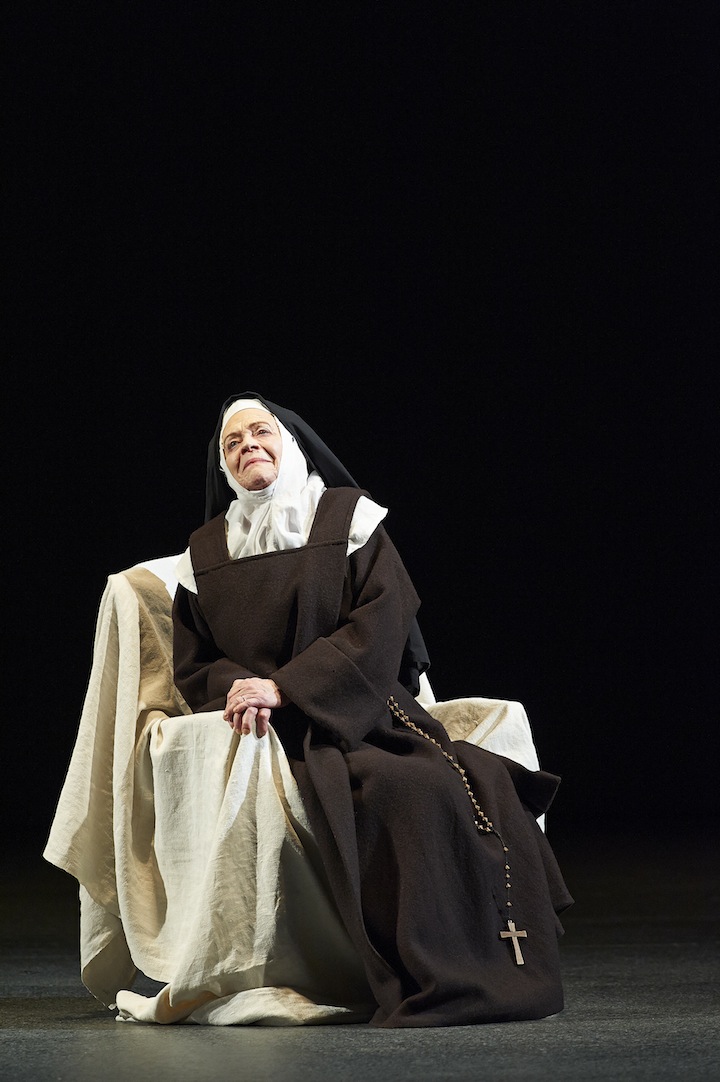
Judith Forst puts capital letters on the word ‘since:’ It’s been 47 years since the Vancouverite earned her Bachelor of Music at University of British Columbia and, this fall, 45 years since her début on stage at the Metropolitan Opera. The mezzo has been singing with the Canadian Opera Company since 1972. And she’s still at it.
- Classical Music 101: What Does A Conductor Do? - June 17, 2019
- Classical Music 101 | What Does Period Instrument Mean? - May 6, 2019
- CLASSICAL MUSIC 101 | What Does It Mean To Be In Tune? - April 23, 2019
Forst opens tomorrow night in the COC’s season-closing production of Dialogues des carmélites, an emotionally searing opera written in 1953 (and premiered in 1957) by French composer Francis Poulenc.
The mezzo is part of a multi-generational constellation of Canadian singers, joining sopranos Isabel Bayrakdarian, Adrianne Pieczonka and Hélène Guilmette in the tragic story of an order of nuns sacrificed to the brutalities of the French Revolution.
The production may have originated in with Nederlandse Opera in 1997, but its director is Toronto-born-and-raised Robert Carsen, who has a highly respected history of distilling an opera to its essential dramatic elements.
The conductor is COC music director Johannes Debus, who has yet to meet an opera score that doesn’t love him back.
Like the abbess who brings audiences to tears in her gentle advice to the young novice in The Sound of Music, Forst sings the role of the leader to whom one looks for guidance and insight in Dialogues. But, as with the whole opera, this is the stuff of tragedy, not musical fluff — all of which spills out of Madame de Croissy as she lies on her deathbed at the end of the first act.
The thought of seeing these great Canadian artists on stage together makes me think of how Forst is the country’s oldest working representative of what our opera singers have achieved since World War II.
Before then, opera in Canada was something done by music schools, determined amateurs and touring companies — usually the Metropolitan Opera. To have a career, one left Canada and never came back.
Now the country’s big cities have their own companies — good ones that do great work (including new opera, in the case of the West). A young Canadian singer can get their start here, go abroad for practical experience and to build a repertoire of roles, then come back and enjoy the comforts of home.
Bayrakdarian, Guilmette and Pieczonka are loved outside Canada and could just as easily pursue their busy calendars from base camp in Munich or Paris or New York. But they prefer home.
Forst was there first, moving to New York to work as a company member at the Met in the late ’60s and early ’70s. She continues to sing around the world and enjoys a network of legendary operatic friends on either side of the Atlantic. But home has been and always will be New Westminster.
The mezzo took time out to be a mother, something a generation before hers labelled as career suicide. Bayrakdarian has been able to do the same. Pieczonka is also a proud mother.
These generational echoes and similarities were rattling around my head as I sat down with Forst, looking, like a novice nun, for insight into the singer’s condition from the vantage point of someone who has seen and done far more than average.
I guess it should have come as no surprise that Forst is one of the most no-nonsense singers I have ever interviewed.
How has she managed to keep singing into her late 60s? By pacing herself and choosing roles carefully, graduating over the decades from the lively transgender roles in Mozart operas and bel canto vocal magic to the arresting older women in operas by Leos Janácek (like the Kostelnicka in Jenufa).
Does she teach or offer master classes? No, because to get proper guidance, a teacher and student need to have a consistent, extended relationship.
And what does she think is the secret to her success? Arriving prepared and doing what the director says.
This may not make for a sensational interview, but it is potently practical advice. Ultimately, how we manage day-to-day details adds up into order or chaos in life’s bigger picture.
It made me think about Bayrakdarian and Pieczonka, both of whom I’ve interviewed before. They arrive prepared. They have a clear sense of who they are and what they can do. And they are not divas.
Perhaps this is part of that elusive thing we call Canadianness. It’s not timbits and a double-double, but a can-do practicality.
Maybe we should do a bit of paraphrasing to describe the successful Canadian musician: Peace, order and good preparedness. It certainly applies to Judith Forst.
For all the details on the Canadian Opera Company production of Dialogues the carmélites, which opens May 8 and closes May 25, click here.
Here’s a moment of vintage Forst with the late Joan Sutherland at a Metropolitan Opera gala concert in 1985. This is the “E infamie e morte” duet from Anna Bolena by Gaetano Donizetti. The conductor is Richard Bonynge:
[This is a corrected version of the original post.]
John Terauds
- Classical Music 101: What Does A Conductor Do? - June 17, 2019
- Classical Music 101 | What Does Period Instrument Mean? - May 6, 2019
- CLASSICAL MUSIC 101 | What Does It Mean To Be In Tune? - April 23, 2019



